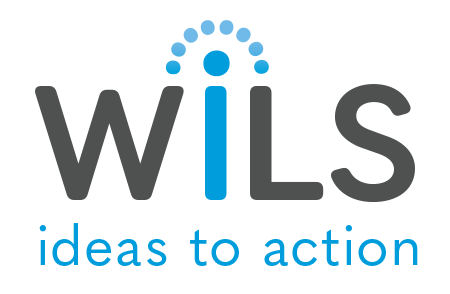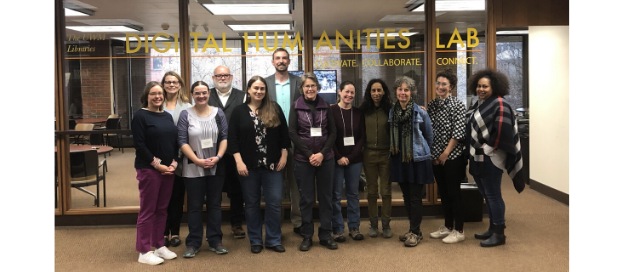
This fall, WiLS began a cooperative agreement with the Institute for Museum and Library Services (IMLS) to mentor a cohort of ten small, rural, and tribal libraries around the country working on community memory projects. These libraries received grants in IMLS’s new Accelerating Promising Practices funding category, which is designed to build capacity at small libraries through participation in a community of practice. Over the next two years, WiLS team members Emily Pfotenhauer and Vicki Tobias will mentor and support this cohort as they take on oral history initiatives, community digitization events, and other projects to document and share their unique local stories.
The ten organizations participating in the IMLS APP Community Memory cohort are:
- Astoria Public Library, Astoria, Oregon
- Benzonia Public Library, Benzonia, Michigan
- Forbes Library, Northampton, Massachusetts
- Hudson Area Library, Hudson, New York
- Huna Heritage Foundation, Hoonah, Alaska
- Jaquith Public Library, Marshfield, Vermont
- Jamestown S’Klallam Tribal Library, Sequim, Washington
- Pella Public Library, Pella, Iowa
- Scott County Library System, Eldridge, Iowa
- Southern California Library, Los Angeles
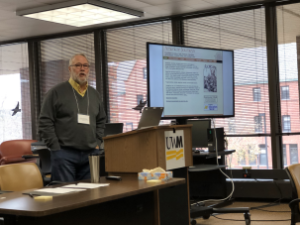
In November, leaders from these organizations came together in the Digital Humanities Lab at UW-Milwaukee for three days of presentations, activities, and discussions.
One of our goals as mentors is to help cohort participants explore and understand the needs of their communities and to challenge them to think through what “authentic and ethical practices and relationships” might look like for themselves, their home institutions, and their local communities.
Guest presentations focused on this theme. Retired Wisconsin Historical Society Director of Programs and Outreach Michael Edmonds shared his experience and insight into the value of user-centered design in building community-centered collections and services. Madison Public Library Community Engagement Librarian Laura Damon-Moore introduced the Madison Living History Project, a collaborative, community-driven story-collecting project. UW-Madison Assistant Director of Residence Life Scott Seyforth acquainted participants with the Madison LGBTQ Archive project as a case study in focused community collection development and uncovering hidden history.
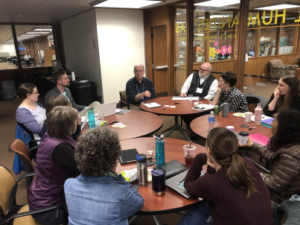
WiLS Community Liaison and Service Specialist Melissa McLimans led participants through a hands-on process planning workshop, “Getting from Here to There,” to help cohort members further hone their project plans and think creatively about efficient and effective project implementation strategies.
Local subject specialists shared their expertise and answered questions during a “World Café” style activity. Topics included copyright and access with UW-Milwaukee Head of Digital Collections, Ann Hanlon; metadata with Marquette University Coordinator of Digital Access and Metadata Liz Kaune; oral histories and community engagement with Laura Damon-Moore; scanning and post-processing with UW-Milwaukee Digital Collections Librarian Ling Meng; and Storage and Digital Preservation with UW-Milwaukee Digital Archivist Shiraz Bhathena.
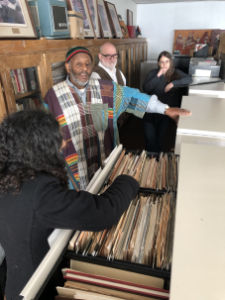
The group enjoyed an illuminating tour of the Wisconsin Black Historical Society with Society founder Clayborn Benson, who shared his deep knowledge of Milwaukee and Wisconsin’s African American communities. Cohort participants were also invited to join UW-Milwaukee Associate Professor and Director of Public History Nan Kim’s presentation “Interviewing Oral History Subjects.” Professor Kim offered her experiences preparing for different types of oral history interviews and a wealth of valuable information for successful interviewing.
Two IMLS staff — STEM and Community Engagement advisor Dr. Marvin Carr and Deputy Director for Library Services Cynthia Landrum — were on hand to answer a range of questions about grant-management logistics and strategies, advice appreciated by cohort members, many of whom are first-time IMLS grant-recipients.
A very special thanks to the UW-Milwaukee Libraries, Associate Vice Provost and Director of the Libraries, Michael Doylen, and Head of Digital Collections and Initiatives, Ann Hanlon for hosting this first in-person gathering.
